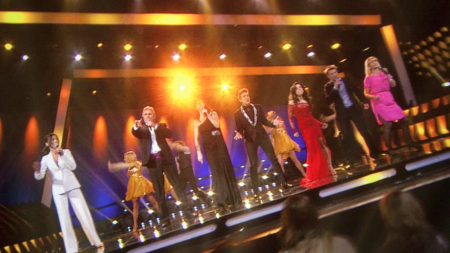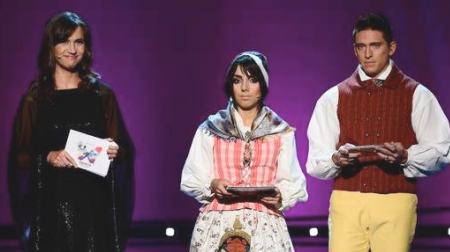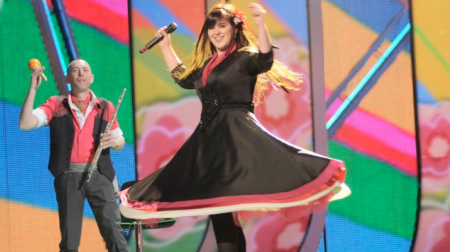This week, the Eurovision world is waiting to hear the running order of the two semi-finals. Previously the running order would have been created through a random draw. Not this year. In the name of making a more entertaining television show, the production team will determine the running order themselves, with a sign-off from the EBU as the only stated check and balance in the process.
There’s a lot of second-guessing going on at the moment, and once we know the running order of the two semi-finals is revealed, they are going to be discussed at great length online. That the human-led running order is going to have an influence on the result is something accepted by almost everyone – apart from Executive Supervisor Jon Ola Sand, who told ESC Insight that “there is indeed no significant statistical impact of the running order on the result” when .
I’m just worried that the whole process of deciding the running order has not taking into consideration one vital piece of information… how people decide which Eurovision song to vote for.
This Is How Sweden Does It For Melodifestivalen
To understand the implications of the running order on the Eurovision Song Contest, and to consider the power that the production team have, let’s look at how SVT’s Christer Bjorkman and his team approach the running order for the heats of Sweden’s Melodifestivalen. It shows off a number of principles that any production team would consider when deciding on a running order at Eurovision.

No Crash, No Boom, No Bang, Thomas Hanses (EBU)
Firstly, on where to put the big names, “I liked the idea to start and end the contest with these two [David Lindgren and Ulrik Munther]. Both of them had a major role in last year’s Melodifestivalen, and I think that there’s an apprehension and curiosity accumulated for what they’re going to do this year.”
The most prestigious slot in any variety show is the final act. Not only must it be someone who has the star-power, but their number shoul also create the moment that the whole show leads up to. “I’ve rather aimed for a strong ending energy-wise,” Bjorkman explained in January. “These entries have a strong potential for a big show and will make the end of the programme sparkle.”
So you have a beginning, and an end. What about everything in the middle, how are those decided? “It was fairly easy. Each of the entries have a strong genre identity, this is about letting every song stand out in its position in the running-order. The stronger the genre identity, the stronger the impact of the songs. The line-up is diverse, in a good and fun way.”
Three rules of thumbs from Melodifestival then… (1) strong opening and closing acts which have the public’s attention; (2) a strong ending with lots of energy; (3) have as much contrast as possible between songs.
This matches the thoughts of Jon Ola Sand, who is aiming for “a well composed programme with a proficient mix between the different elements are key factors for a good result.”

Robert De Niro’s waiting for Melodifestivalen, Olle Kirchmeier (SVT)
If Eurovision was all about showcasing songs, I would have no issue with any of these rules. But as the name suggests, the Eurovision Song Contest is a contest, and the referees and organisers of a contest should take great care to not unbalance the competitive field.
The running order changes continue to be debated, and were tweaked at the recent Heads of Delegation meeting in Malmo. Entrusting the order to human hands (and not a random draw) should make for a better show for the viewers at home, but by following the above principles, the producers may be starting from a false assumption.
Is the correct way to present the competing songs through constant contrast and genre diversity?
How Do People Judge Eurovision Songs?
How people make decisions of personal taste and preference is a huge area of academic study. If you are looking for an overview, a good starting point would be Thomas Mussweiler’s paper on the Comparison Process from 2003.
Two main styles of comparison are identified. Contrast is where people will do a direct comparison of two items, and will focus on the elements that are different to aid their judgement, with the points of difference determining which is ‘better’, while Assimilation will compare similar elements in two items to decide which is the ‘better’ with respect to their shared and similar features.
“..the default evaluative consequence of similarity testing is assimilation, whereas dissimilarity testing typically leads to contrast.”
Mussweiler, T. 2003, Comparison Processes in Social Judgement: Mechanisms and Consequences (Psychological Review 110 (3) 472-489).
From what we have read from SVT and the EBU, decisions about the running order for Eurovision are going to be based on the contrast model of comparison, but is this how the viewers at home will be judging the music from Malmo?
Houston, We Have A Problem
To determine this, let’s turn to a study by Lionel and Katie Page, which evaluated the public’s judgement on another popular music-based television show where the public can vote, The X-Factor. Analysing over 1500 performances, over 165 shows, the evidence points to a process of assimilation.
Specifically, one’s performance evaluation is influenced by the evaluation of the previous contestant. If you perform after a weak contestant there is a bias such that you are more likely to be evaluated poorly than if you perform after a strong contestant. Therefore, we find evidence for an assimilation effect with respect to sequential judgements.
Drs Lionel Page and Katie Page, A Field Study Of Biases In Sequential Performance Evaluation On The Idol Series (Journal of Economic Behavior and Organization (2008).
Anecdotally, this feels right. Think about how people discuss the songs after watching them on TV. Many talk about similar areas: she had nicer hair, the key change was smoother, the ethnic drums had a nice beat. This is the assimilation process at work.
Which gives us a bit of a problem.

Thomas G:son contemplates a key change
The assumption at Eurovision has always been that you want to have a song in front of you that is slower than your song, that has a weaker singer, or a less impressive stage show. The contrast would make you stand out more. As Bjorkman points out, this principle is already being used by SVT at Melodifestivalen, and as highlighted by the EBU as one of the main lines of reasoning behind the rule change.
“Allowing the producers to determine the running order will help to make more exciting television shows and allows each contestant to stand out, instead of being surrounded by entries in similar style or tempo,”” commented Jon Ola Sand as the rule was .
While it might make for a more exciting television show, the criteria that the production team will be using takes very little consideration of how people will judge and vote on the songs in this year’s Contest. Evidence suggests that viewers are judging the Eurovision Song Contest in a way that is the complete opposite of how the production team and the organisers think they judge the show.
In other word, this emphasis on contrast might have an unintentionally negative impact on the outcome of the competitive element of the Contest.
One Of These Things (Is Not Like The Others)
By using contrast as the key element to constructing a running order, you will get an entertaining presentation of all the songs at this year’s Eurovision Song Contest. What you do not get is a fair environment which is suitable to evaluating songs and performances on the night.

Now they’re just a Tavares tribute band… Alain Douit (EBU).
By focussing on the entertainment part of the experience, the producers are introducing even more bias into the competition, irrespective of the impact that the running order as a whole has. This is bias that does not seem to have been taken into account. The factors that provide the best TV show do not have a natural correlation with the factors that provide the best comparative space to judge the songs.
In this rush to try and make the Song Contest a more entertaining show, the EBU should be striving to be fair and neutral at all times. Even then, many followers of the Contest are expecting to see some form of bias in the running order. The SVT production team and the EBU do not have their heads in the sand, and hopefully have procedures in place to minimise bias effects.
But if the starting point for the production team is contrast, and people are judging by assimilation, these corrections will be worthless, and they could be potentially disadvantage a number of songs in the Contest without even realising.









Whether the running order is determined by the luck of the draw or by the production team, some songs will get screwed by their place in the running order. The difference is that in the latter case we will most likely have a more logical flow of songs and a more entertaining show.
Rene, there will always be winners and losers, and this is why I believe that the Contest should return to a fully random draw. There are so many factors to take account of with a producer-led running order that they are going to have an impact on the result. Fans focus on the ‘who runs later’ aspect, but the assimilation process of scoring is yet another factor. How SVT are going to be able to say their running order is ‘fair’ escapes me.
But has a Melodifestivalen running order ever unseated a rightful winner? This might just be me being sceptical, but there’s another key difference between X Factor and Eurovision… narrative. X Factor is (more and more obviously with each passing year) designed to lead the viewer’s judgement in a direction it may not have done of its own accord.
The best example of this is Susan Boyle’s first audition. Everything right down to the faces of choice audience members, background music, intervention of the presenters is extremely manipulative. Whether or not the voting in these shows undergoes any fixing is another factor altogether, but considering the point of the show is simply to find an incredible singer worthy of comparison to the lofty heights of Elton John or Whitney Houston, what we tend to end up with is an army of prettyboys, guilty pleasure novelties, diva #4092, and the odd older person with the “aww” factor. Not to mention the performances on these talent shows are also producer led, not only in running order but with pre-recorded backing vocals and seemingly no limit as to how many people are allowed on stage to maximize a performance. These shows also seem to encourage gossip and hysterical teenage supporting of a popular contestant. An assimilation process suits these shows in order to support this way of thinking.
Now I haven’t read the paper by Drs. Page but do they actually have any show where a contrast model is used to compare the assimilation process to? We didn’t really have many shows like this in the 20th century. How do we know the assimilation process is the only natural way that people judge songs? With Eurovision, there is very little narrative, and it does need a little more, something I hope the artist’s postcards will provide, but the general idea is “here’s 26 songs from all over Europe, vote for your favourite.” There’s no inviting of debate, no manipulation of our natural course of judgement, nothing to lead us on in any way except our tastes. So maybe while the assimilation process works for Simon Cowell’s evil empire of television abomination, the contrast model might be what works for Eurovision, as a festival and a feel-good show. I’d also like to point out that ratings show people are getting sick of X Factor while the more light hearted Strictly Come Dancing has regained popularity. Not to mention Bjorkman has been running Melodifestivalen for longer than X Factor has even existed and he is still breaking audience records, while Eurovision proper, nigh on 60 years old, holds fairly steady with its ratings. Assimilation and negativity might make for a bit of fun in the short term, but you certainly don’t need to write an academic paper to prove what audiences keep coming back for more of, year after year after year.
The running order will be ‘fair’ in the sense that the production team will try to not advantage or disadvantage certain countries on purpose. We’ll have to give them the benefit of the doubt on that point until proven otherwise. Nobody wants to be in the #2 slot of death, which statistically and historically has done worse than other slots, but someone has to be, whether through a random draw or because the production team puts them there.
If I had to come up with a running order for the first half of the first semi-final, it would look something like this:
1) Denmark (start of with a bang)
2) Estonia (contrast the opening with a classic ballad)
3) Slovenia (then a modern up-tempo song)
4) Netherlands (followed by a moody waltz)
5) Austria (time for a light, happy pop song before we all burst into tears)
6) Croatia (finally some men on stage)
7) Ukraine (we ran out of real up-tempo songs, but this’ll do)
8) Russia (close it before the break with a power ballad)
Is that a fair running order? Depends on your definition of fair. The 1st spot typically does better than the 2nd spot, for example, but Denmark makes the most sense as the evenings opening act. It makes for a more entertaining show. Yes, Estonia gets the #2 slot of death, but then again, someone has to perform second. Does it harm Ukraine that it has to perform in between Croatia and Russia? I honestly can’t say.
Contrast this with a random draw (you could do one yourself right now). Is that more fair? Again, depends on your definition of fair, but it will almost definitely make for a poorer flow of songs.
Yes, Eurovision is a contest. It should be fair. However, it is also, and perhaps foremost, an entertainment show. It is not a scientific survey of what is the best song. For that, songs would have to be presented to each viewer in a different, random order to prevent the running order from having an impact. Songs would have to be made anonymous in some ways, to prevent “neighbor voting” and other geographic biases. It would also mean that songs couldn’t be made public before the show, etcetera. All these things are simply not feasible, nor would they make for a entertaining show.
My point is I think, that yes, the running order will have an impact on how viewers will judge songs. However, I do believe that the production teams will strive to create a running order that will maximize the entertainment value of the show and not look for opportunities to advantage or disadvantage certain countries on purpose. Checks and balances are already in place to ensure that, such as drawing the starting place of the home country and dividing the countries into the first half or the latter half of the show. It might not be perfect yet, but I do believe the intention is right.